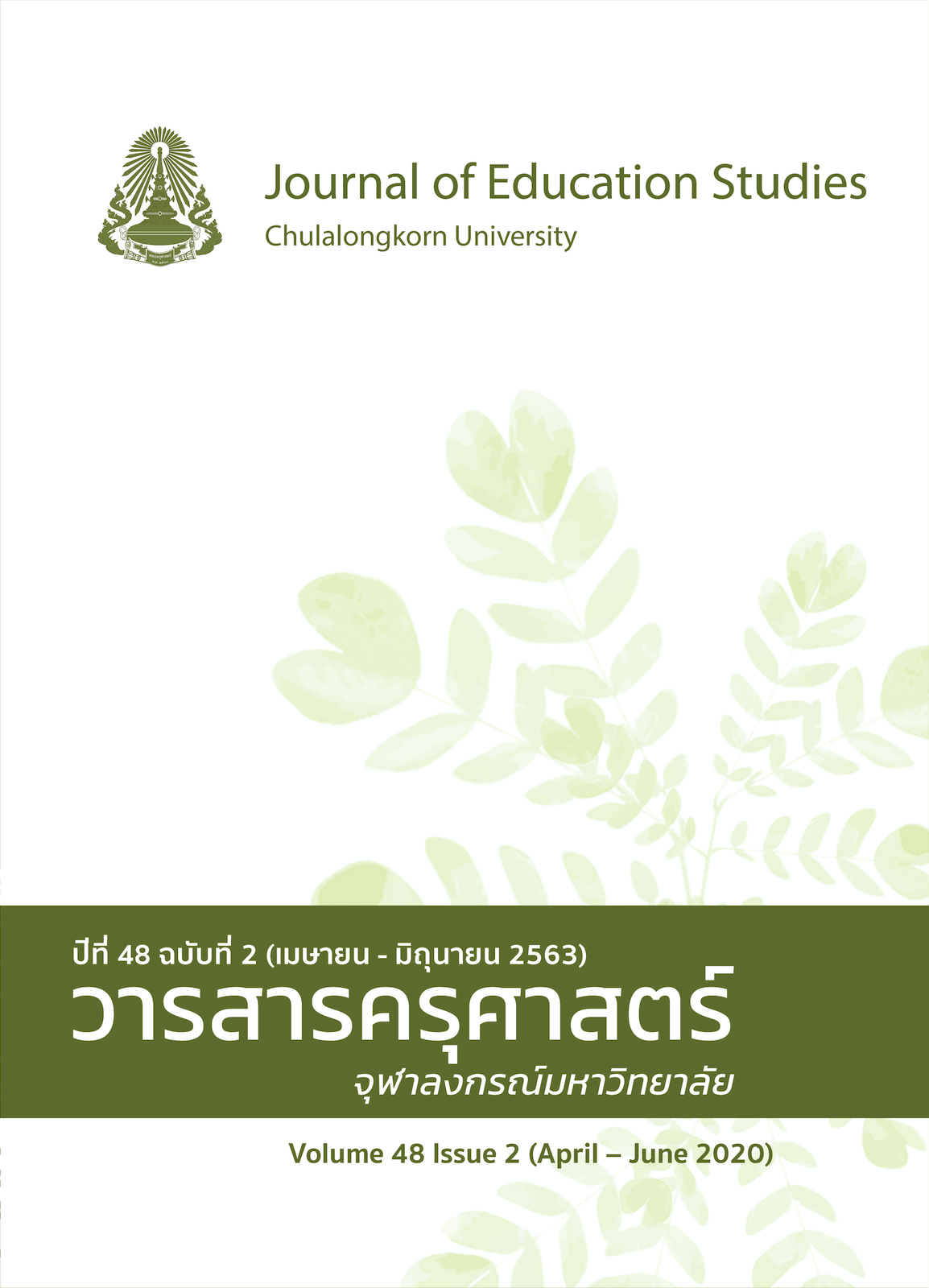Effects of Health Education Learning Management using Problem-Based Learning and Social Information Processing Theory on Learning Achievement and Problem-solving Abilities with Respect to Cyberbullying Behavior of Eighth Grade Students
DOI:
https://doi.org/10.14456/educu.2020.59Keywords:
health education learning management, problem-based learning, social information processing theory, problem solving abilities on cyberbullying behaviorAbstract
This study is an experimental research. The purposes of this study were: 1) to compare the average score of the learning achievement and problem solving abilities with respect to cyberbullying behavior of an experimental student group before and after implementation of problem-based learning, and 2) to compare the average score of the learning achievement and problem solving abilities with respect to cyberbullying behavior between the experimental group students and the control group students after implementation. The sample included 70 students from the eighth grade of Santirat Wittayalai School in Bangkok. Thirty-five students were assigned to the experimental group to study under the health education learning management system using problem-based learning and social information processing theory, while the other 35 students in the control group were assigned to study with conventional teaching methods. The research instruments comprised eight learning activity plans using problem-based learning and social information processing theory. The data were analyzed by means, standard deviations and t-tests.
The research findings are as follows: 1) The mean scores of the learning achievement in the area of knowledge, attitude, practice, and problem-solving abilities with respect to cyberbullying behavior of the experimental group students after learning were significantly higher than before learning, at a .05 level. The mean scores of the learning achievement in the area of knowledge, attitude, practice, and problem-solving abilities with respect to cyberbullying behavior of the control group students after learning were found to have no significant differences compared to before learning, at a .05 level. 2) The mean scores of the learning achievement in the area of knowledge, attitude, practice, and problem-solving abilities with respect to cyberbullying behavior of the experimental group after learning were significantly higher than the control, at a .05 level.
References
กนก จันทรา. (2556). ผลของการจัดกิจกรรมการเรียนรู้สังคมศึกษาโดยใช้ปัญหาเป็นฐานที่มีต่อความสามารถในการแก้ปัญหาและความรับผิดชอบต่อสังคมของนักเรียนชั้นมัธยมศึกษาปีที่ 5 [วิทยานิพนธ์ปริญญามหาบัณฑิต, จุฬาลงกรณ์มหาวิทยาลัย]. CUIR. http://cuir.car.chula.ac.th/handle/123456789/42968
กระทรวงศึกษาธิการ. (2551). หลักสูตรการศึกษาขั้นพื้นฐาน พุทธศักราช 2551. คุรุสภาลาดพร้าว.
แคทรียา มุขมาลี และ วิมล สำราญวานิช. (2554). การพัฒนาความสามารถในการแก้ปัญหาและผลสัมฤทธิ์ทางการเรียน วิชาวิทยาศาสตร์ เรื่อง อาหารกับการดำรงชีวิต ของนักเรียนชั้นมัธยมศึกษาปีที่ 2 โดยใช้การจัดกิจกรรมการเรียนรู้แบบใช้ปัญหาเป็นฐาน. ใน รวมบทคัดย่อการประชุมวิชาการเสนอผลงานวิจัย ระดับบัณฑิตศึกษา ครั้งที่ 15 (น. 2594-2602). มหาวิทยาลัยขอนแก่น.
จินตนา สรายุทธพิทักษ์. (2557). โปรแกรมสุขภาพในโรงเรียน. โรงพิมพ์แห่งจุฬาลงกรณ์มหาวิทยาลัย.
ทิศนา แขมมณี. (2560). ศาสตร์การสอน: องค์ความรู้เพื่อการจัดกระบวนการเรียนรู้ที่มีประสิทธิภาพ. สำนักพิมพ์แห่งจุฬาลงกรณ์มหาวิทยาลัย.
บุญเลี้ยง ทุมทอง. (2556). ทฤษฎีและการพัฒนารูปแบบการจัดการเรียนรู้ (Theories and development of instructional model). เอส.พริ้นติ้ง ไทย แฟคตอรี่.
ประเวศ วะสี. (2537). ยุทธศาสตร์ทางปัญญาแห่งชาติ. มูลนิธิภูมิปัญญาร่วมกับสมาคมนักข่าวแห่งประเทศไทย.
ไพฑูรย์ สินลารัตน์. (2558). ปฏิรูปการเรียนรู้: ปฏิรูปการศึกษากลับทางจากล่างขึ้นบน (พิมพ์ครั้งที่ 2). พี.เอ. ลีฟวิ่ง.
รังสิรัศม์ วงศ์อุปราช และ พีร วงศ์อุปราช. (2555). การศึกษาเปรียบเทียบการเรียนรู้ทางอารมณ์และ สังคมของนักศึกษาปริญญาตรีระหว่างมหาวิทยาลัยรัฐและเอกชน. วารสารวิชาการมหาวิทยาลัยธนบุรี, 6(กรกฎาคม), 11.
วัฒนาพร ระงับทุกข์. (2542). การจัดการเรียนการสอนที่เน้นผู้เรียนเป็นศูนย์กลาง. แอล ที เพรส.
สำนักงานเลขาธิการสภาการศึกษา กระทรวงศึกษาธิการ. (2550). การจัดการเรียนรู้แบบใช้ปัญหาเป็นฐาน. สกศ.
สำนักงานสถิติแห่งชาติ. (2558). วิเคราะห์เด็กและเยาวชน. บางกอกบล็อก.
สุชาติ โสมประยูร และ เอมอัชฌา วัฒนบุรานนท์. (2553). เทคนิคการสอนสุขศึกษาแบบมืออาชีพ. ดอกหญ้าวิชาการ.
ภาษาอังกฤษ
Ali, A. (2016). How effective the problem-based learning (PBL) in dental education. A critical review. The Saudi Dental Journal, 28, 155–161.
Cyberbullying Research Center. (2012, April 4) How many teens are actually involved in cyberbullying?. https://cyberbullying.org/how-many-teens-are-actually-involved-in-cyberbullying
Görzig, A., & Lara, A., F. (2013). Cyberbullying experiences on-the-go: When social media can become distressing. Cyberpsychology: Journal of Psychosocial Research on Cyberspace 7(1), 4.
Hülya, G., O., & Serdal, S. (2012). The effect social information processing in six-year-old children has on their social competence and peer relationships. Early Child Development and Care, 182(December), 1623–1643.
Reuters. (2012, January 11). Cyberbullying a problem around the globe: Poll. https://www.reuters.com/article/us-cyberbullying-poll/cyberbullying-a-problem- around-the-globe-poll-idUSTRE80A1FX20120111
Sheri, B., Donna, C., & Jenny, W. (2013). Principles of cyberbullying research: Definitions, measures, and methodology. Routledge.
Simpson, D. (1972). Teaching physical education: A system approach. Houghton Mufflin.
Smith, P., K., Mahdavi, J., Carvalho, M., Fisher, S., Russell, S., & Tippett, N. (2008). Cyberbullying: its nature and impact in secondary school pupils. The Journal of Child Psychology and Psychiatry, 49(4), 376–385.
Sofie, M. M., L., Suzanne, H. J., Jeroen, M., & Tamara, v., G. (2015). Problem-based learning as a facilitator of conceptual change. Learning and Instruction, 38, 34-42.
van Reemst, L., Fischer, T. F., & Zwirs, B. W. (2016). Social information processing mechanisms and victimization: A literature review. Trauma, Violence, & Abuse, 17(1), 3-25.
Yair, Z., David, O., & Abraham, S. (2004). Social information processing in middle childhood: Relations to infant-mother attachment. Attachment & Human Development, 6(September), 327–348.
Downloads
Published
How to Cite
Issue
Section
License

This work is licensed under a Creative Commons Attribution-NonCommercial-NoDerivatives 4.0 International License.




